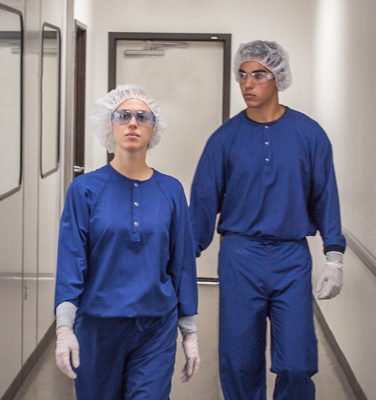Work uniforms are an integral part of many different industries, and while most people associate uniforms with restaurant staff or police officers, there are certain businesses that need uniforms not for identification or branding purposes but rather to prevent contamination of the immediate environment. These are businesses that operate specialized processing environments known as cleanrooms. For cleanroom industries, the proper uniform supplier can help ensure that these businesses can function according to applicable safety standards.
A cleanroom can be defined as a controlled environment where pollutants like dust, airborne microbes, and aerosol particles are kept at very low levels to facilitate certain manufacturing processes or scientific research. Cleanrooms are commonly used in industries where extremely small particles can adversely affect sensitive processes.
If you run a business that requires cleanroom supplies or cleanroom garments, it is important that your uniform supplier understands you, your company, and your employees’ needs. Prudential Overall Supply is the partner you can depend on for a variety of cleanroom services, including uniform rentals and garment processing. Let’s take a closer look at the world of cleanrooms and the benefits of using a professional cleanroom apparel service.
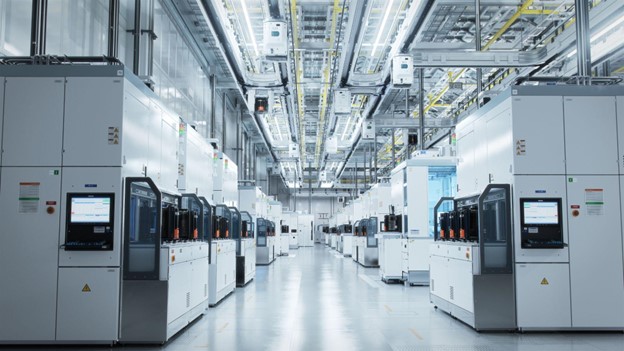
THE IMPORTANCE OF KEEPING CLEANROOMS CLEAN
Cleanrooms are used in industries like pharmaceuticals, biotech, electronics, and aerospace, where maintaining a low level of environmental pollutants such as dust, airborne microbes, aerosol particles, and chemical vapors is critical. The integrity of a cleanroom is fundamental to the production process and the quality of the products. Contamination in such environments can lead to significant issues, including:
- Product Quality Degradation – In industries where products are highly sensitive to environmental conditions, such as semiconductor manufacturing or pharmaceuticals, any contamination can compromise the quality and efficacy of the product. This can result in significant financial losses.
- Increased Costs – Contamination can lead to the shutdown of production lines for cleaning and validation, which is time-consuming and costly. Moreover, contaminated products often need to be discarded, leading to material waste and additional production costs to replace the faulty products.
- Heightened Safety Risks – In pharmaceutical and biotechnology industries, contamination can pose serious health risks to consumers. For example, microbial contamination in drug production can lead to infections and other adverse health effects in patients using these medications.
- Equipment Damage – Particulates and chemical vapors can accumulate and damage sensitive equipment used in cleanroom environments. This damage can lead to costly repairs and maintenance, and potentially shorten the lifespan of expensive machinery.
- Regulatory Non-Compliance – Cleanrooms must adhere to strict regulatory standards specific to their industry, such as ISO classifications and GMP standards. Failure to maintain cleanliness can lead to regulatory violations and serious legal consequences.
- Distorted Research Findings – In research and development labs, contamination can lead to inaccurate data and results, which can lead to false conclusions.
When it comes to cleanrooms, there are many different factors that contribute to ensuring a space remains clean. Having the right cleanroom supplies is an important part of ensuring that what is brought into the room (and who enters the room, for that matter) will not compromise the clean environment.
Clean and, when required, sterile supplies and work uniforms help minimize the amount of contaminants that can enter a space. Prudential Overall Supply (Prudential Cleanroom Services) rents, leases, and sells cleanroom apparel of the highest standards. We also offer laundry services to provide cleanroom work apparel that can be validated sterile when required.
HOW CLEANROOM SUPPLIES HELP EXPAND YOUR BUSINESS
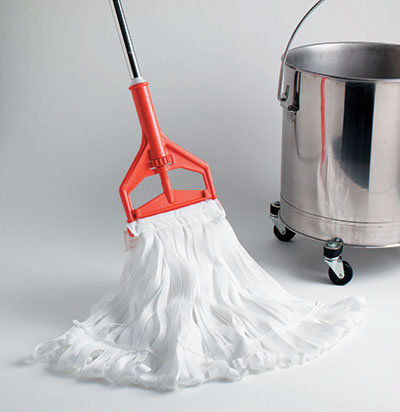
Cleanrooms are essential environments for a number of industries where the smallest contaminants can disrupt manufacturing processes, compromise product integrity, and pose health risks. These controlled environments are designed to minimize levels of particulate matter present in the area—this can include dust, particles, and airborne organisms. Key industries that depend heavily on cleanrooms include:
Pharmaceuticals and Biotechnology
- Drug Manufacturing – Cleanrooms in the pharmaceutical industry are vital for the production of vaccines, injectables, and other medications that must be free from microbial and particulate contamination.
- Biotechnology Research – Clean environments are necessary for the manipulation of biological samples that are sensitive to environmental contaminants, which could affect experimental results and product development.
Semiconductor and Electronics Manufacturing
- Chip Manufacturing – Semiconductor fabrication plants use manufacturing cleanrooms to prevent contaminants from causing defects on the microscopic circuits of semiconductor wafers.
- Electronic Assembly – Cleanrooms are used in the assembly of electronic components such as hard drives, sensors, and microprocessors, where particulate contamination can lead to device failure.
Aerospace and Defense
- Satellite Assembly – The assembly and testing of satellites and other space equipment often occur in cleanrooms to prevent contamination that could lead to failures in the harsh environment of space.
- Defense Equipment Manufacturing – Precision manufacturing of components for defense systems often requires cleanroom conditions to ensure the high reliability required for military applications.
Optical Industry
- Lens Manufacturing – The production of lenses for cameras, microscopes, and eyewear requires cleanrooms to prevent dust from affecting the optical properties of the lenses.
Medical Device Manufacturing
- Implants and Surgical Instruments – Cleanrooms are used in the manufacturing of medical implants like hip replacements and surgical instruments to ensure they are free of contaminants that could cause infections.
Nanotechnology
- Material Science Research – Cleanrooms facilitate the development of nanoscale materials and devices, where even atomic-level contamination can skew research outcomes and functionalities.
Automotive Industry
- Sensor Production – Modern vehicles, which use extensive sensor systems for functions like autopilot and advanced safety features, require the sensors to be manufactured in cleanroom settings to ensure reliability.
Food Technology
- Food Packaging – Some segments of the food packaging industry use cleanrooms to pack products that require high purity levels, such as baby food and clinical food products.
Automotive
- EV battery (electrification) market
Each of these industries relies on cleanrooms to control the environment to the extent that external conditions do not interfere with manufacturing or development processes. Having access to the right cleanroom supplies is absolutely essential for the optimal functioning of these spaces. That’s why it can be fairly said that cleanroom supplies can expand your business. If your business operations rely on cleanrooms, you simply can’t perform certain activities without specialized gear. There are a large number of businesses about which this can be said.
Companies specializing in providing cleanroom services and supplies play a critical role in the setup and maintenance of these facilities by ensuring that industries meet stringent cleanliness requirements.
The type of cleanroom apparel used by employees varies by industry and the specific workflows of the environment. Prudential offers a variety of cleanroom garments and accessories to ensure that the number of contaminants entering a cleanroom is kept to a minimum.
MAKING SURE FACILITIES ARE CLEAN
Various strategies and tactics are employed to minimize the levels of contaminants in these critical environments and promote effective cleanroom sanitation. These practices include:
Controlled Environment Access
Access to cleanrooms is strictly limited to essential personnel, with the use of airlocks and interlocks to transition from less controlled environments. This approach significantly reduces the amount of external contamination introduced into the cleanroom.
Environmental Control
The cleanroom air is continuously filtered through High Efficiency Particulate Air (HEPA) or Ultra Low Particulate Air (ULPA) filters to remove particulates. Stable temperature and humidity levels are maintained to prevent microbial growth and reduce static electricity, which can attract dust.
Cleaning Protocols
Cleanrooms undergo scheduled cleaning using specially designed supplies such as mops, wipes, and safe disinfectants. All surfaces, floors, walls, and equipment are regularly cleaned, and contamination control mats are placed at all entry points to prevent particles from entering the clean area.
Particle Monitoring
Particle levels within the cleanroom are continuously monitored to detect contamination spikes, allowing for immediate corrective actions. Regular air quality testing for microbial contamination is also conducted; this is particularly important in the pharmaceutical and biotechnology industries.
Training and Awareness
Cleanroom personnel receive regular training on cleanroom protocols and procedures to minimize contamination. Training covers proper gowning techniques, behavior within the cleanroom, and material handling. Clear signage is also used to maintain awareness and ensure compliance.
Material Handling
All materials and equipment entering the cleanroom are cleaned or treated to ensure they do not introduce contaminants. Techniques such as air showers may be employed to remove particulates from personnel and materials before entry.
Proper Personnel Gearing
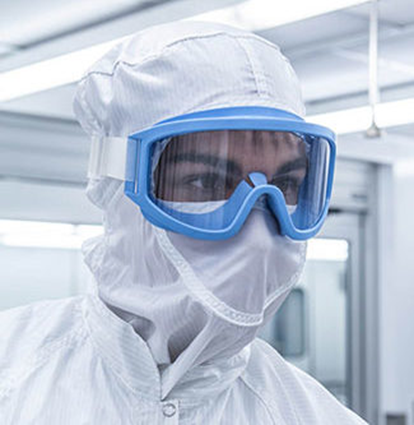
Personnel are required to wear specialized cleanroom gowns, hoods, masks, boots, and gloves designed to trap contaminants from the human body. These garments are regularly changed and cleaned to prevent them from becoming contamination sources themselves.
Human beings naturally emit a certain level of contaminants; these are generally not harmful. When entering into a controlled environment such as a cleanroom, however, these contaminants can pose a serious threat. That’s why patients with weakened immune systems are only allowed to see visitors and doctors who are wearing specifically designed garments to protect these patients from outside contaminants.
It cannot be overemphasized that the right clothing and supplies are essential for properly minimizing the levels of contaminants. Using high-quality, cleanroom-approved supplies such as wipes, mops, goggles, detergents, and cleanroom garments can significantly impact the ability to maintain a contaminant-free environment. Companies that specialize in cleanroom gowning systems and reusable supplies—like Prudential Overall Supply—understand the stringent requirements of these environments and provide products that help maintain the critical cleanliness standards required in such settings.
Cleanroom supplies include cleanroom garments, which are designed to help protect humans from contaminating the environment and to protect employees from coming into contact with any potentially dangerous substances. There are goggles and glasses, as well as hair nets and hats, for the cleanroom environment, which help protect employees and the integrity of any cleanroom.
THE IMPORTANCE OF CHOOSING A TRUSTED SUPPLIER
When it comes to choosing an appropriate cleanroom supplier, you want to go with a business that has a reputation for quality and customer service.
There are so many regulations and stipulations associated with cleanroom environments, and partnering with the wrong business supplier could lead to disaster. That’s why it’s important to go with a name that is trusted, that adapts to the times, and that knows the cleanroom field well.
Prudential Overall Supply has been in the business of supplying other companies with uniforms and basic supplies for over 90 years. In 1960, Prudential Cleanroom Services decided to get into cleanroom services, and since then we’ve been providing businesses with cleanroom gowning supplies and a variety of related accessories.
Since 1960, the regulations for companies that operate cleanrooms have changed dramatically. Prudential has always been ahead of the curve in being able to adapt for our customers. In addition to offering great customer service and quality products that we stand behind; we also follow industry-leading eco-friendly practices.
Types of Prudential Apparel
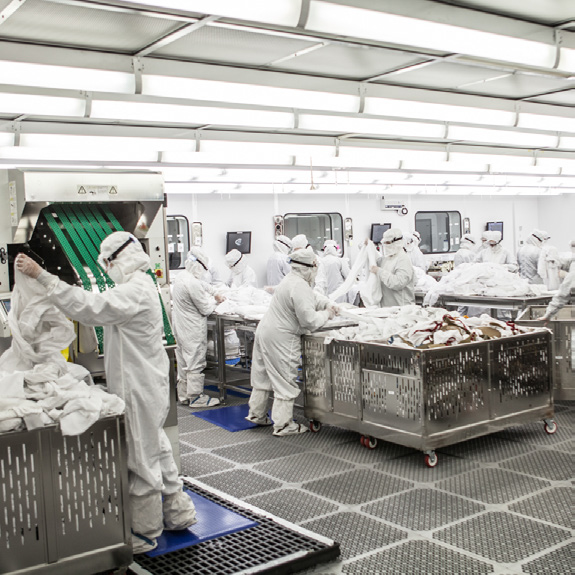
Prudential Overall Supply offers a range of cleanroom apparel designed to meet the stringent requirements of controlled environments. Our product offerings include both sterile and non-sterile garments that utilize non-linting, high-density fabrics resistant to liquids and bacteria, ensuring safety and compliance in cleanrooms.
Among the items available from Prudential are cleanroom gowns, coveralls, and suits with features such as electrostatic discharge (ESD) properties, which protect sensitive electronic components from static damage.
Prudential’s cleanroom apparel includes the HD ESD sterile and non-sterile suit, which is ideal for pharmaceutical, biotechnology, medical devices, hospitals, and agricultural industries. This Prudential Overall Supply cleanroom garment has received a high rating in all categories.
Prudential Overall Supply also offers other work uniforms fit for cleanrooms, which allow for more flexibility, like our innerwear micro denier. This uniform comes in two different pieces and can be paired with taffeta shoes and hair coverings to ensure that the environment remains as clean as possible. It is made with contamination-control fabrics designed to limit the incidence of cross-contamination. In addition, this particular cleanroom suit is made with sustainable materials, which means that it is better for the environment and also costs less money to make versus disposable alternatives. Prudential Overall Supply is able to pass these savings along to our customers without sacrificing quality.
Prudential also offers cleanroom socks and a variety of personal protective equipment (PPE) designed for use in these types of settings. On top of that, we provide additional reusable products like cleanroom mops, cleanroom goggles, and cleanroom face masks. These items can be cleaned and cycled back into use, thereby reducing waste.
Explore our website for detailed info about our various cleanroom apparel and reusable non-garment products.
How Prudential Can Help
The cleanroom industry can be wasteful, and we have implemented recyclable programs in our cleanroom services wherever we can, without compromising the quality of the cleanroom garments and apparel that we offer, to ensure that our products delivered into every cleanroom are suitable for use in these environments.
Prudential Overall Supply has the proper laundering facilities to ensure that cleanroom garments are cleaned to the industry standards and that each time they are used they are clean. For quality control purposes, Prudential tracks the number of times that a cleanroom garment has been cleaned.
